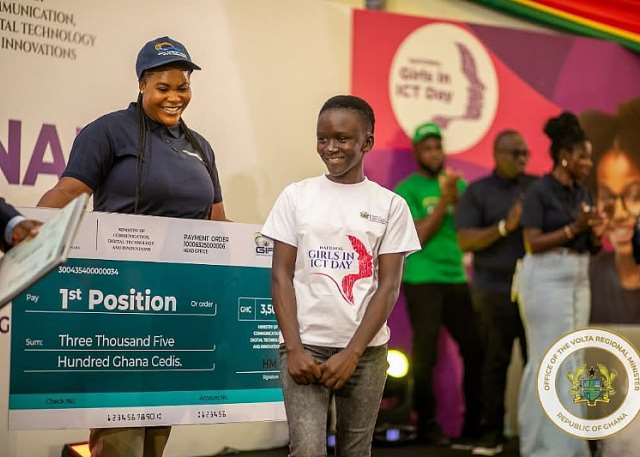The Government’s commitment to promoting female empowerment in technology took a major leap forward as 1,000 girls across 18 districts in the Volta Region successfully completed a three-week intensive training under the Girls-in-ICT programme.
Spearheaded by the Ministry of Communication and Digital Innovations, the initiative culminated in a colourful awards ceremony held at the Cedi Auditorium of the University of Health and Allied Sciences (UHAS) in Ho.
The Girls-in-ICT programme, an extension of the global initiative by the International Telecommunication Union (ITU), seeks to empower girls and women to pursue careers in Information and Communication Technology (ICT) and related STEM fields. Ghana’s version of the programme aims to train 3,000 girls and 300 teachers annually, including Persons Living with Disabilities.
The Volta Regional edition, which climaxed on June 25, 2025, saw the top 100 performing girls receiving laptops and certificates of excellence. Ten outstanding teachers were also presented with laptops for their dedication. Three exceptional students were specially honoured with cash prizes for their stellar performance.
To ensure sustainability and continuity, the Ministry announced plans to establish fully equipped ICT labs in the schools of the three top-performing girls. These labs are intended to serve as hubs for continued learning and innovation.
Sector Minister Hon. Sam George Nartey described the programme as a game-changer. He emphasised its potential to provide vital digital skills and exposure to young girls, helping bridge the gender gap in the digital economy.
“This initiative gives our girls the tools to participate fully in the digital revolution and prepares them for exciting careers in technology,” he said.
Minister of Gender, Children and Social Protection, Hon. Agnes Naa Momo Lartey, praised the initiative and appealed to the private sector, educators, and development partners to help sustain and expand the programme.
“We must come together to support these efforts so our girls can reach greater heights in technology and innovation,” she stated.
Speaking on behalf of Togbe Afede XIV, Togbe Ayim Adzokoto II commended the ITU and local partners for maintaining the programme’s momentum. He acknowledged the many barriers girls face in ICT, including inadequate infrastructure, gender stereotypes, economic limitations, and cybersecurity risks.
Despite these challenges, Togbe Ayim expressed optimism about the potential of young Ghanaian girls.
“Our girls have shown brilliance, resilience, and innovation when given the opportunity. It is our collective responsibility—government, parents, teachers, and community leaders—to support their journey in the tech world,” he urged.
The Girls-in-ICT initiative continues to make a lasting impact by equipping young girls with relevant digital skills and narrowing the gender gap in technology. By fostering inclusive education and innovation, the programme contributes to a more balanced and empowered digital future for Ghana.


